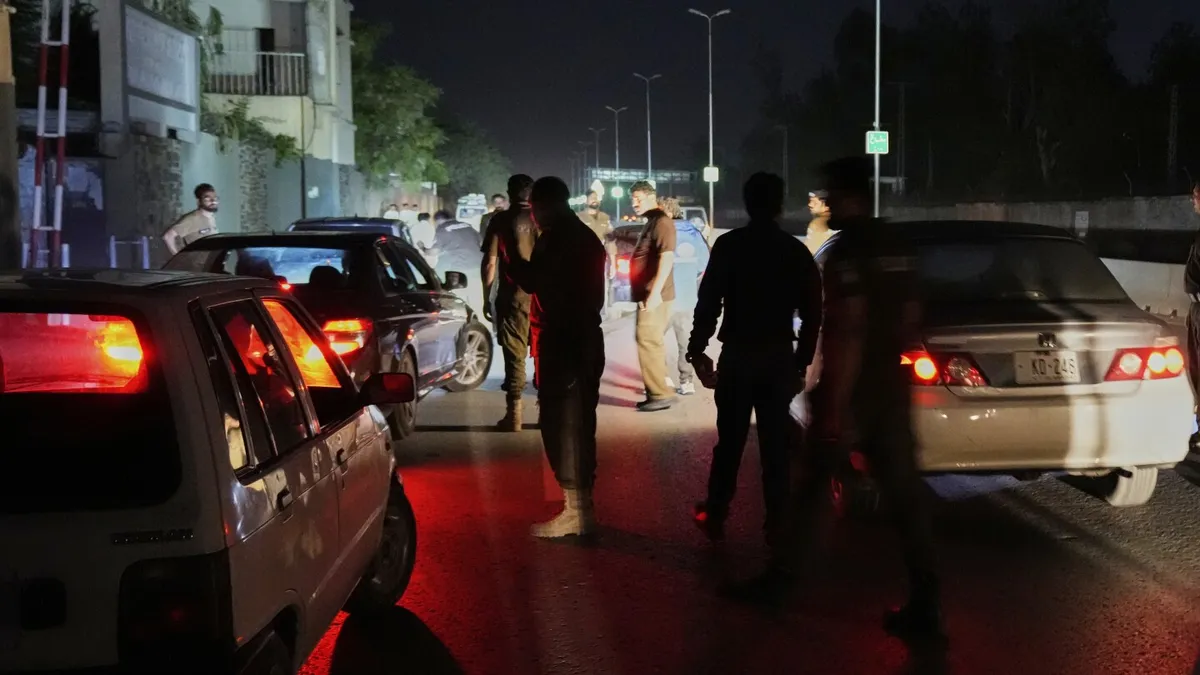
In a significant escalation of conflict between Pakistan and India, the Pakistani military reported that India launched missiles targeting three air bases within its territory on Saturday. Fortunately, most of these missiles were intercepted, and Pakistan announced that retaliatory strikes against India were already in progress. This latest round of hostilities follows a tragic massacre last month, which India attributed to Pakistani support.
The Pakistani military stated that it deployed medium-range Fateh missiles aimed at an Indian missile storage facility, as well as airbases located in Pathankot and Udhampur. However, there has been no independent verification of the claims made by either side regarding the military actions. Army spokesman, Lt. Gen. Ahmad Sharif, assured that Pakistan's air force assets remained secure, even after the Indian strikes. He also noted that some Indian missiles impacted areas in India’s eastern Punjab.
Prime Minister Shehbaz Sharif of Pakistan convened an urgent meeting of the National Command Authority, responsible for overseeing the country’s missile program and other strategic military assets. This development underscores the rising tensions between the two nuclear-armed nations. The conflict has intensified since an attack at a popular tourist destination in India-controlled Kashmir on April 22, which resulted in the deaths of 26 civilians, primarily Hindu tourists. India has accused Pakistan of orchestrating this assault, a claim that Islamabad vehemently denies.
U.S. Secretary of State Marco Rubio engaged in discussions with Pakistani Army Chief Asim Munir on Friday, emphasizing the need for both nations to find avenues for de-escalation. The U.S. has offered assistance in initiating constructive dialogues to prevent further conflicts, highlighting the urgency of the situation.
According to Pakistan’s military spokesman, the Indian missile strikes targeted several key air bases including Nur Khan air base in Rawalpindi, Murid air base in Chakwal, and Rafiqui air base in Jhang district, located in eastern Punjab province. Notably, there was no media access to the Rawalpindi air base, a densely populated area, and initial reports indicated that residents did not hear or witness any immediate strike activity.
In the aftermath of the Pakistani military's announcement of retaliation, residents in Indian-controlled Kashmir reported hearing loud explosions across various locations, including the major cities of Srinagar and Jammu, as well as the garrison town of Udhampur. Shesh Paul Vaid, a former police official in the region, noted that the explosions felt distinctly different from previous drone attacks, suggesting a more serious military engagement.
Srinagar appeared relatively calm early Saturday, yet residents near the city’s airport—also an air base—reported being startled by the sounds of explosions and fighter jets. Mohammed Yasin, a resident, described how explosions disrupted his family's sleep, indicating the psychological toll of the ongoing conflict.
Senior analyst Praveen Donthi from the International Crisis Group remarked that both countries are effectively in a state of war, regardless of their official terminology. He emphasized the lack of strategic objectives from either side, stating, "It’s become a remorseless race for military one-upmanship." With civilian casualties rising on both sides, he warned that finding a peaceful resolution will prove increasingly difficult.
India's army reported the destruction of multiple armed Pakistani drones over military installations in Amritsar, northern Punjab, asserting that Pakistan's actions threaten India's sovereignty and endanger civilian lives. The Indian military's statement underscored the ongoing tension and the potential for further conflict.
In response to the escalating situation, Pakistan’s civil aviation authority suspended all flight operations at the country’s airports. Meanwhile, public sentiment in major cities reflected strong support for the armed forces, with citizens chanting slogans in favor of military action. One resident, Muhammad Ashraf from Lahore, expressed gratitude for the Pakistani response to what he termed Indian aggression.
As both nations continue to exchange military strikes and heavy cross-border fire, the toll on civilians is becoming increasingly concerning. The Group of Seven nations (G7) has called for “maximum restraint” from both India and Pakistan, warning that further military escalation could pose a serious threat to regional stability.
The situation remains fluid, with ongoing developments likely in the coming days. As the world watches, the urgent need for diplomatic efforts to resolve this conflict becomes more evident.